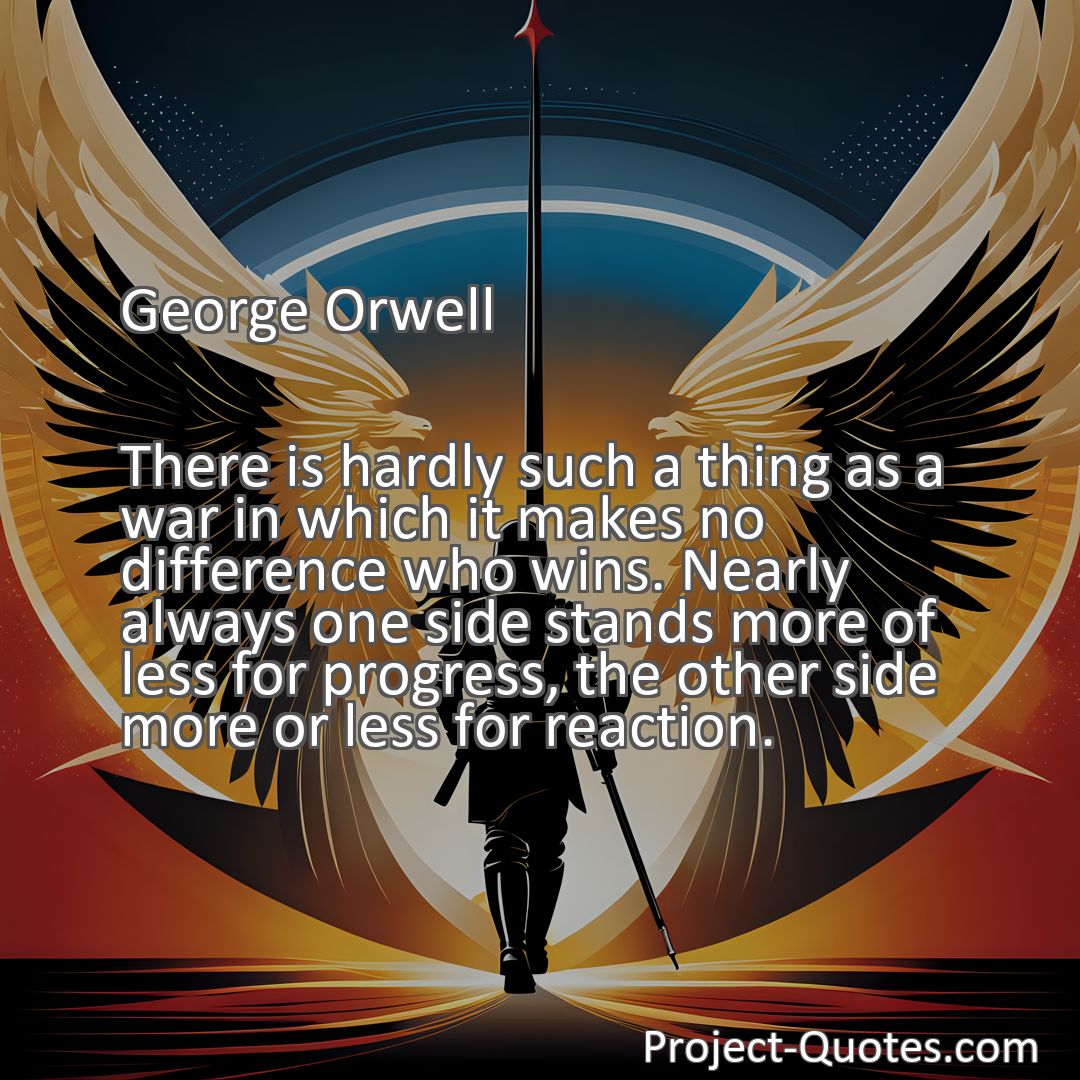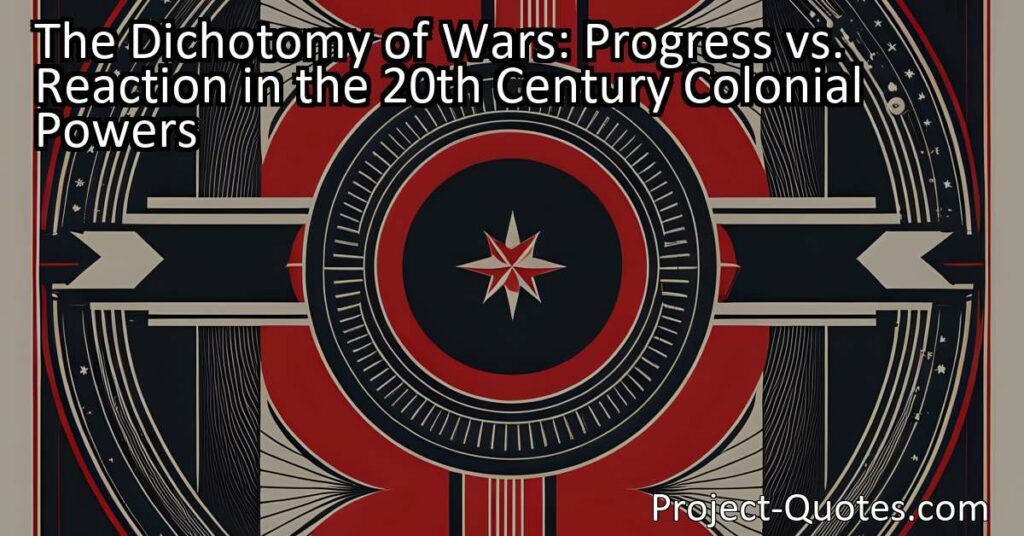There is hardly such a thing as a war in which it makes no difference who wins. Nearly always one side stands more of less for progress, the other side more or less for reaction.
George Orwell
The 20th century saw colonial powers standing for reaction while independence movements and nationalists represented progress. These conflicts, such as decolonization struggles in Africa and Asia, marked turning points in history and shaped the destinies of these regions. The outcome of these wars had far-reaching consequences, impacting nations, regions, and the global stage.
Table of Contents
- 1 There is hardly such a thing as a war in which it makes no difference who wins. Nearly always one side stands more of less for progress, the other side more or less for reaction.
- 2 George Orwell
- 3 Meaning of Quote – There is hardly such a thing as a war in which it makes no difference who wins. Nearly always one side stands more of less for progress, the other side more or less for reaction.
- 4 Freely Shareable Quote Image
- 5 Related
Meaning of Quote – There is hardly such a thing as a war in which it makes no difference who wins. Nearly always one side stands more of less for progress, the other side more or less for reaction.
In the words of the wise George Orwell, “There is hardly such a thing as a war in which it makes no difference who wins.” With this quote, Orwell highlights the significant impact that the outcome of a war can have on society. Throughout history, countless conflicts have arisen, each with its own set of ideologies and causes. Whether it is a war fought for freedom, justice, or power, there is always a distinction between the two opposing sides. One side often represents progress, while the other side symbolizes reaction.
When we examine the history of warfare, we can clearly see this dichotomy in action. Many wars have been fought under the banner of progress, aiming to bring about positive change and advancement. These conflicts often arise from a desire for societal reforms, the pursuit of civil rights, or the establishment of a more egalitarian system. On the flip side, there are instances where wars are waged in defense of the status quo, seeking to maintain traditional values and structures.
Take, for example, the American Civil War. It was a conflict that erupted over the issue of slavery, with the Union representing progress and the Confederacy standing for reaction. The Union fought to abolish the dehumanizing institution of slavery and preserve the United States as a democratic nation. On the other hand, the Confederacy fought to retain the oppressive system of slavery, refusing to embrace the changing social values of the time.
Similarly, World War II serves as another prime example. The Allied forces, led by the United States, Great Britain, and the Soviet Union, fought against the Axis powers of Nazi Germany, Italy, and Japan. The Allies, driven by the principles of democracy, individual rights, and freedom, stood for progress. In contrast, the Axis powers, under the leadership of Adolf Hitler and Benito Mussolini, represented reaction, seeking to establish authoritarian regimes that suppressed dissent and championed oppressive ideologies.
It is worth noting that in some cases, the lines between progress and reaction may appear blurred or skewed depending on one’s perspective. History shows that the victors are often the ones who get to write the narrative, shaping the perception of the conflict. However, the underlying principles and values that each side upholds can still be identified.
Beyond these well-known wars, throughout history, countless lesser-known conflicts have mirrored this dichotomy. For instance, the struggles for decolonization in Africa and Asia during the 20th century saw colonial powers standing for reaction, while the independence movements and nationalists represented progress. These wars marked a turning point in the history of these regions, shaping their destinies and laying the foundations for future development.
Moreover, the quote by Orwell implies that the outcome of a war can have far-reaching consequences, impacting not only the nations involved but the world at large. When nations or ideologies clash, their differences reverberate across borders, potentially shaping the future trajectory of entire regions and influencing global dynamics.
In today’s world, where conflicts and tensions persist, Orwell’s quote serves as a poignant reminder that the outcome of any war is consequential. Whether it is a geopolitical struggle for influence, a fight for human rights, or an ideological battle, the culmination of these conflicts can have lasting effects on societies and individuals alike.
Consider the ongoing conflict in Syria. The war, which began in 2011, has resulted in immense humanitarian suffering, displacement, and a complex web of geopolitical interests. On one side, we have the Syrian government, led by President Bashar al-Assad, which stands for reaction a regime accused of human rights abuses and suppressing political dissent. On the other side, we find various opposition groups and factions fighting for progress, seeking to establish a more inclusive and democratic society.
The war in Syria has not only ravaged the country but also had far-reaching consequences beyond its borders. It has fueled the rise of extremist groups such as ISIS, displaced millions of people, and drawn in regional and international powers. The outcome of this conflict will shape the future of Syria and potentially impact the stability of the entire Middle East.
In conclusion, George Orwell’s assertion that “There is hardly such a thing as a war in which it makes no difference who wins” holds true throughout history. From the American Civil War to World War II and countless other conflicts, opposing sides have consistently represented progress or reaction. The outcome of these wars has had significant consequences, shaping the trajectory of nations, regions, and the world as a whole. As we navigate the complexities of contemporary conflicts, it is vital to understand the underlying values and ideologies at stake. Only then can we fully comprehend the impact that the outcome of these wars can have on our collective future.
I hope this quote inspired image brings you hope and peace. Share it with someone who needs it today!


